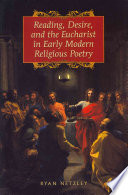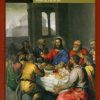(EBOOK PDF)Reading Desire and the Eucharist in Early Modern Religious Poetry 1st Edition by Ryan Netzley 9781442694927 1442694920 full chapters
$50.00 Original price was: $50.00.$35.00Current price is: $35.00.
Reading Desire and the Eucharist in Early Modern Religious Poetry 1st Edition by Ryan Netzley – Ebook PDF Instant Download/Delivery: 9781442694927, 1442694920
Full download Reading Desire and the Eucharist in Early Modern Religious Poetry 1st Edition after payment

Product details:
• ISBN 10:1442694920
• ISBN 13:9781442694927
• Author:Ryan Netzley
Reading, Desire, and the Eucharist in Early Modern Religious Poetry
The courtly love tradition had a great influence on the themes of religious poetry—just as an absent beloved could be longed for passionately, so too could a distant God be the subject of desire. But when authors began to perceive God as immanently available, did the nature and interpretation of devotional verse change? Ryan Netzley argues that early modern religious lyrics presented both desire and reading as free, loving activities, rather than as endless struggles or dramatic quests.
Reading, Desire, and the Eucharist analyzes the work of prominent early modern writers—including John Milton, Richard Crashaw, John Donne, and George Herbert—whose religious poetry presented parallels between sacramental desire and the act of understanding written texts. Netzley finds that by directing devotees to crave spiritual rather than worldly goods, these poets questioned ideas not only of what people should desire, but also how they should engage in the act of yearning. Challenging fundamental assumptions of literary criticism, Reading, Desire, and the Eucharist shows how poetry can encourage love for its own sake, rather than in the hopes of salvation.
Reading Desire and the Eucharist in Early Modern Religious Poetry 1st Table of contents:
Contents
Acknowledgments
Introduction: Desiring Sacraments and Reading Real Presence in Seventeenth-Century Religious Poetry
1 Take and Taste, Take and Read: Desiring, Reading, and Taking Presence in George Herbert’s The Te
2 Reading Indistinction: Desire, Indistinguishability, and Metonymic Reading in Richard Crashaw’s
3 Loving Fear: Affirmative Anxiety in John Donne’s Divine Poems
4 Desiring What Has Already Happened: Reading Prolepsis and Immanence in John Milton’s Early Poems
Conclusion: Reading Is Love
Notes
Bibliography
Index
People also search for Reading Desire and the Eucharist in Early Modern Religious Poetry 1st:
reading desire and the eucharist in early
reading desire and the eucharist in early modern religious poetry
eucharist readings for today
how do you explain the eucharist
purpose of the eucharist
Tags:
Reading Desire,the Eucharist,Ryan Netzley



